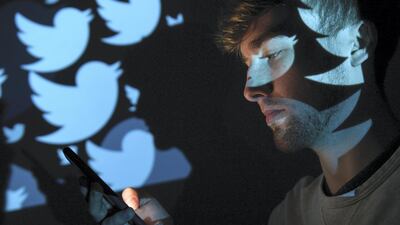Prominent conservatives in the United States including Secretary of State Mike Pompeo are accusing Twitter of targeting the political right after seeing drastic drops in their following on the social platform.
On his personal Twitter account, Mr Pompeo posted a screen grab showing that well-known figures on the political right, including himself, lost a lot of followers, while several liberal leaders gained some.
“This is how you create an echo chamber,” he wrote, implying that there was an effort under way to silence conservative voices on Twitter.
Shortly before that tweet, Mr Pompeo suggested there was a broader effort to try and clamp down on free speech.
“Sadly, this isn’t a new tactic of the left,” he wrote. “They’ve worked to silence opposing voices for years.
Referring to the people who voted for Donald Trump in the election on November 3, he said: “We cannot let them silence 75 million Americans.”
Sarah Huckabee Sanders, a former press secretary for President Trump, also vented on Twitter about her sudden, substantial drop in followers.
“I've lost 50,000 followers this week,” she wrote on Saturday. “The radical left and their big tech allies cannot marginalise, censor, or silence the American people,” she wrote.
She said the moves were akin to something seen in China, adding: “We are a free country.”
While not responding specifically to such accusations, Twitter did seek to “clear up confusion” about follower fluctuations.
“To prevent spam, we regularly challenge accounts to confirm details like email and phone number,” the company said. “Until that info is confirmed, these accounts aren’t included in follower counts.”
“Big tech” has been a target of both liberals and conservatives in the US in recent years, but often for different reasons.
Democrats have pointed to the sheer size of companies such as Facebook and Twitter from an anti-trust, user privacy and competition standpoint, while conservatives claim these social media companies have stifled their voices and are therefore a threat to democracy.
What is often left out of the latter part of this debate, however, is that both Facebook and Twitter are private companies and, therefore, are not beholden to uphold all aspects of free speech.
"The First Amendment applies to government and government alone, not the private sector," Peter Yacobucci, a political science professor at Buffalo State University, said in a previous interview with The National on free speech and social media.
Mr Yacobucci said that as the prevalence of the internet takes hold, there might be room for debate as to how much editorial control the platforms have.
“At this point we’re not far enough along in constitutional jurisprudence to know the answer,” he said.
A man claiming to be a former teacher at a school attended by Ms Sanders criticised her tweet about free speech, insisting she did not understand the First Amendment.
“You were a student at Little Rock Central High when I taught AP government there, but you didn’t take the advanced class,” Dana Deree wrote. “If you had, maybe you would better understand the First Amendment and the difference between limits on government and freedoms for private individuals.”
Facebook and Twitter have insisted that they welcome vigorous and healthy debate. Inciting violence, however, breaches both companies’ terms of service.
After the deadly pro-Trump demonstrations in Washington DC on January 6, both Twitter and Facebook removed Mr Trump’s account. They said the US president helped to incite the violence.
In addition, according to NBC News, Twitter also suspended the accounts of several high-profile Trump supporters such as Michael Flynn and Sidney Powell.
Ms Powell, a lawyer who pushed Mr Trump’s efforts to overturn the election results, and Mr Flynn, a former National Security Adviser who was indicted during his brief time serving in the Trump administration, have both been known to push what is known as the “QAnon” conspiracy theory.
The QAnon theory, which has taken hold in recent years, claims that devil-worshipping cannibals run a paedophilia ring, and that prominent politicians support it. A survey by Hope not Hate, a UK-based campaign group, found that as many as one in 10 Americans at least in part subscribe to these claims.
Back in July, Twitter removed thousands of accounts that promoted QAnon.
“We will permanently suspend accounts tweeting about these topics that we know are engaged in violations of our multi-account policy, coordinating abuse around individual victims, or are attempting to evade a previous suspension,” the company said in a thread posted in July.
These previous moves provide a glimpse into Twitter’s previous pushes to keep the social media platform free from harmful material that could incite violence.
Some conservatives had made it a point to abandon both Twitter and Facebook, instead opting for Parler, a social media platform that became popular with the political right, but that too, has proved problematic.
Apple and Google removed the Parler app from the stores while Amazon suspended the platform from its web-hosting service, saying the app’s operators had not done enough to limit threats of violence from various users on the platform.
Mr Trump refuses to acknowledge his loss in the presidential election, insisting that the election was rigged, and has repeatedly urged his supporters to oppose the result. His Facebook and Twitter accounts were suspended after many felt that he used the platforms to encourage violent protests.
After his supporters stormed the US Capitol building last Wednesday, he released a video urging them to leave while still promoting his unproven claims of electoral fraud.


